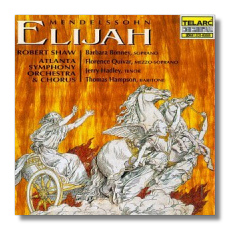
The Internet's Premier Classical Music Source
Related Links
- Mendelssohn Reviews
- Latest Reviews
- More Reviews
-
By Composer
-
Collections
DVD & Blu-ray
Books
Concert Reviews
Articles/Interviews
Software
Audio
Search Amazon
Recommended Links
Site News
 CD Review
CD Review
Felix Mendelssohn

Elijah, Op. 70
Thomas Hampson, baritone
Barbara Bonney, soprano
Henriette Schellenberg, soprano
Florence Quivar, mezzo-soprano
Marietta Simpson, mezzo-soprano
Jerry Hadley, tenor
Richard Clement, tenor
Thomas Paul, baritone
Reid Bartelme, treble
Atlanta Symphony Orchestra & Chorus/Robert Shaw
Telarc 2CD-80389
Summary for the Busy Executive: Horrible.
Is Robert Shaw deliberately trying to trash his own reputation? Telarc should never have released this mess, and you can trace almost everything that has gone awry directly to Shaw. Most important, Shaw seems to have no idea of the arc of a piece or of the importance of subsidiary motives. As far as I'm concerned, this is Mendelssohn's masterpiece, and Mendelssohn knew how to build themes from cells, if nothing else. Indeed, in Elijah he even plays with tag lines, beginning with the opening "As God the Lord of Israel liveth," which reappears as "As God the Lord of Sabbaoth liveth," transformed from major to minor. Shaw stumbles as early as the overture, an angry fugue that should eventually hit like hammer blows – an effect that depends not only on the conductor's ability to build a crescendo over the long haul, but also on the conductor's realization of the elegance and economy of Mendelssohn's idiom. For Mendelssohn, as for Mozart, every note counts. In Elijah, this economy translates directly into dramatic power – a lesson Mendelssohn learned from late Beethoven and, through him, from Handel. Under Shaw's baton, the overture is merely "a lot of notes played very fast." Furthermore, although Mendelssohn wrote no opera, Elijah comes very close. Several numbers coalesce into "scenes." The first four numbers, for example, may be considered the Plea of the Israelites to end the drought God has sent them. Several numbers comprise the trial between Elijah and the priests of Baal. With Shaw, we get little feel for the narrative, except for those transitions Mendelssohn himself writes in. "He watching over Israel" rushes by, leaving no impression at all. It's not that Shaw does it worse than others. He does it worse than himself. I've heard him lead performances of this which ravished me. I have no idea what's got into him. Finally, the playing and choral singing overall is blaring and raw, rather than powerful, but the blame again lies with Shaw's failure to shape the music. In short, if Elijah's première performance had been as clueless as this one, it would have sunk without a trace.
On the other hand, we can certainly qualify the disaster. Certain numbers come off beautifully indeed. "Blessed are all they that fear Him" winds out like a river. "Behold, God the Lord" searches wildly for the Lord through mighty winds, earthquake, and fire, to find Him in the "still, small, voice." In "He that shall endure" and "Holy is God the Lord," solo quartet and chorus interweave their lines with grace.
The best part of the performance comes from the soloists, however. I've not been a great fan of Thomas Hampson (although his recording of Mahler Lieder is stunning), but his Elijah shoves Fischer-Dieskau's back in line. The tone is beautiful, his diction is superb, his "line-readings" show great artistry. In short, everything works. He gives us the prophet's anger in "Is not His word like a fire," Mendelssohn's fabulous rewrite of Handel's "For He is like a refiner's fire," and the prophet's weariness in "It is enough." Above all, he plays the drama convincingly. Fischer-Dieskau's slight accent and the occasional overly woebegone reading marred an otherwise excellent performance. Barbara Bonney raptures me out in "Hear ye, Israel," with an achingly sweet tone. Henriette Schellenberg and Marietta Simpson touch the heart in their "Zion spreadeth her hands for aid." Most of the others do fine, even though Florence Quivar's "O rest in the Lord" doesn't make me forget Janet Baker's. Thomas Paul's mighty bass-baritone always got my blood running. It's a welcome blast from the past.
Jerry Hadley, on the other hand, does an embarrassingly gushy turn. He clutters up his line with so many "expressive" upward scoops, that one begins to wonder whether he could ever hit a note straight on. It's a parody of opera singing, as a matter of fact, with no musical intelligence behind it. It comes across as an irritating tic. It's sad. Hadley has a fine tone. I don't recall him ever singing this badly before. However, he's by no means alone in indulging himself in this way. A lot of younger singers do this, including the popular Bryn Terfel. I suspect they don't listen to the best older singers, who managed to create ravishing tone and direct communication without sacrificing their line. Listen to Gigli, Pinza, del Monaco, Melchior, Schlusnus, Rehkemper, Ameling, Baker, Partridge, and so on and so forth. There's no excuse for a line more oleaginous than 3-in-1. The problem is that, as he ages, his voice will want to do this, and, if he wants a career, he'd better drop these slides now while they're still a bad habit.
Telarc provides its usual gorgeous sound, but I don't care. For the sweep of the work, save your pennies for Dietrich Fischer-Dieskau, the glorious Janet Baker in her prime, the young Gwyneth Jones, and Nicolai Gedda, led by Rafael Frühbeck de Burgos, with a chorus prepared by the legendary Wilhelm Pitz, all on an EMI "two-fer" (72435-68601-2). Cheaper and more satisfying.
Copyright © 1997, Steve Schwartz





















